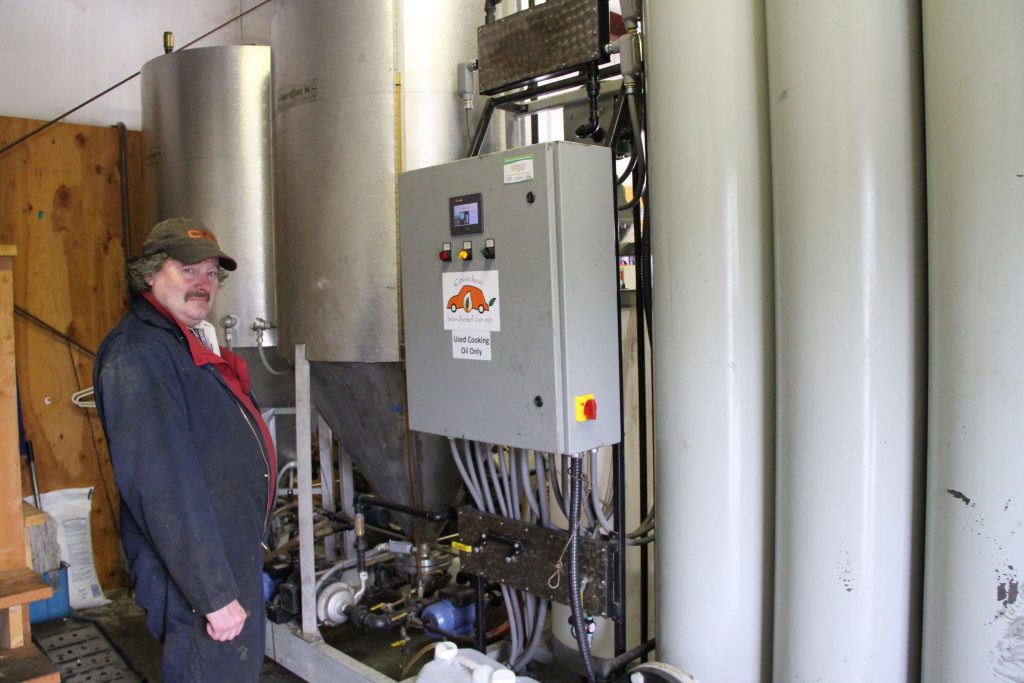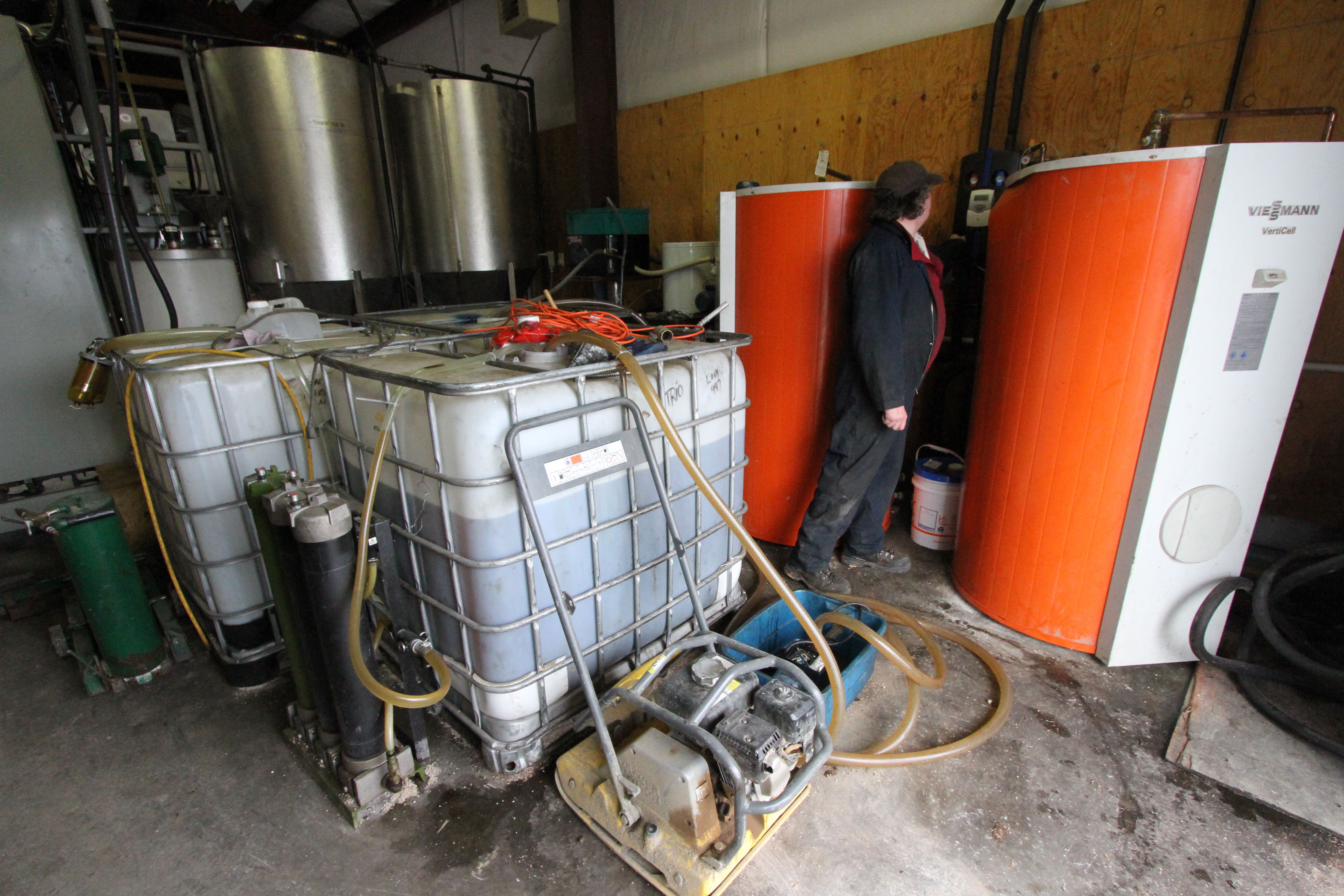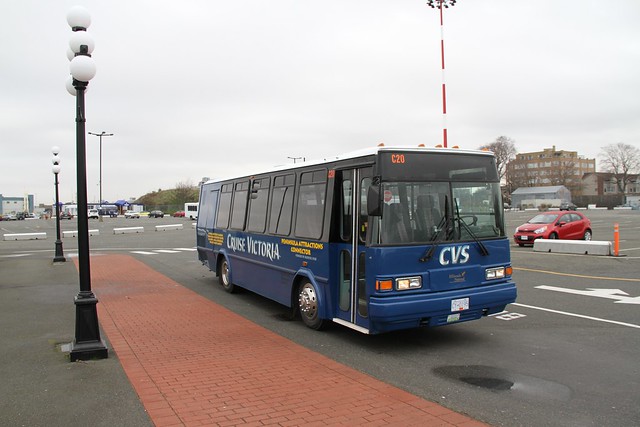By David Dodge and Duncan Kinney
With 17 micro-breweries the 750,000 people who call Vancouver Island home are well served by beer makers. But it’s a different kind of Vancouver Island micro-brew that caught our attention, it’s a plucky little biodiesel cooperative at a farmer’s market to selling between 150,000 to 200,000 litres a year.
As you walk into the Cowichan Biodiesel Cooperative’s processing facility in Duncan B.C., it really does look like a microbrewery. Tanks, pumps, hoses and other assorted machinery are all reminiscent of the brew master’s trade. But unlike the yeasty, worty smell that you get at a brewery the biodiesel processing facility has the faint hint of French fries.
And when you ask a long-time customer about why they spend the extra-money for their home-made diesel she’s got a quick answer.

Daryl Giesbrecht is the brew master at the Cowichan Biodiesel Co-op that takes used vegetable oil from cruise ships and restaurants and refines it for use in cars and buses. Photo David Dodge
“I got involved because I wanted to get off fossil fuels,” says Lynn Wytenbroek, a founding member.
And like any microbrewery or small, grassroots organization you need dedicated customers.
“But personally, I prefer to be on 100 per cent as much as possible. I’ve even driven out to Alberta with the trunk of the car full of biodiesel so I didn’t have to fill up at a gas station.”
When Wytenbroek says 100 per cent she means B100, the designation that refers to a fuel comprised of 100 per cent biodiesel. B20 by comparison, is a mixture of 20 per cent biodiesel and 80 per cent petro-diesel.
Biodiesel is a safe, clean, ready-to-use alternative transportation fuel that in this case is made with used vegetable oil. It can be put into almost any diesel engine and when used, produces far less pollution, specifically the nasty black smoke and particulates you see coming out of far too many vehicles. Compared to regular petro-diesel, biodiesel produces far less polycyclic aromatic hydrocarbons, a known carcinogen.
Biodiesel also produces far less greenhouse gas emissions as well. A study from the National Renewable Energy Laboratory, a lab of the US Department of Energy, found in a life cycle study that buses using 100 per cent biodiesel (B100) produced 78 per cent less carbon dioxide emissions.
Scaling up: Of buses and cruise ships
While customers like Wytenbroek help you get off the ground, it’s customers like Cruise Victoria Services (CVS) which help you scale up. CVS is a sightseeing and tour operation that’s run out of Victoria, BC and they have a fleet of 19 buses.
They switched to B20, or 20 per cent biodiesel in 2007.
“For the first six months we didn’t even tell our driving staff that they were running biofuel. Ultimately when we did announce it everybody was quite surprised because there was zero impact in terms of the overall operation with the exception of lower overall emissions,” says Gary Gale, managing director with CVS.

Gary Gale, managing director of Cruise Victoria Services bus lines that run on clean burning biodiesel fuel from the Cowichan Biodiesel Co-operative. Photo David Dodge
They gradually ramped up to B100 and they are, as far as we know the only company in North America running a major fleet of buses on biodiesel fuel.
“Customers love it. The side of the bus has actually has B100 biodiesel right on the side of it and customers, mainly U.S. customers, are really thrilled by the fact that, you know, that somebody’s taken measures that we have in order to adapt to the B100 system,” says Gale.
Here’s where the story gets a little serendipitous. As CVS ramped up their demand for biodiesel fuel the Cowichan Biodiesel Cooperative was able to tap into the waste vegetable oil from the 220 cruise ships that dock at Ogden Point in Victoria every year. The cruise ships come in on one side of the pier and the bus line is based in the same building.
“And that’s a great sustainable closed-loop system, recycling the waste product from the cruise ships and turning it into a value-added biofuel that is then used to take those tourists around Victoria,” Brian Roberts, the president of the Cowichan Biodiesel Cooperative.
Half of their feedstock now comes from those cruise ships with the other half coming from restaurants. Even regular folks can even come and drop off their used vegetable oil at a little drop-off station at the local landfill. It’s not a lot, but it is a way for average people to contribute and learn about their transportation fuel options. The local county folks don’t mind it either as it keeps the waste cooking oil out of the sewer system where it clogs pipes and costs them big money.
The price: Farmer’s market vs. Superstore
We can’t dance around it, the biodiesel from the Cowichan Biodiesel Cooperative costs more than your typical litre of petro-diesel. There is about a $0.40 to $0.50 cent premium – petro-diesel was $1.29 and the biodiesel was $1.78. Much to the frustration of coop members, over $0.40 of this cost is tax which includes a provincial carbon tax on this carbon neutral fuel.
Biodiesel is a premium product that Roberts compares to organic foods. Biodiesel, like organic food produced by a nearby farmer is not only better for your health it’s better for the local economy as well.
Customer Lynn Wytenbroek agrees: “My $1.78 per liter goes into this community. It stays in this community and that helps the local economy. That’s very important; it’s like buying local food, which I also do precisely for that reason.”
The local angle even applies when it comes to suppliers. The coop has a sticker they give to restaurants that supply them with vegetable oil that identifies to locals that their used vegetable oil gets turned into biodiesel.
The Cowichan Bio-Diesel Co-operative is now in the process of installing a second biodiesel pump that will provide B100 and various mixtures of bio/petro-diesel fuel to the vehicles of its members which now includes project partner the Cowichan Valley Regional District.
Biodiesel will never replace petro-diesel by itself, but getting not just people to eat locally but cars as well means less of a dependence on a volatile, unhealthy commodity.


